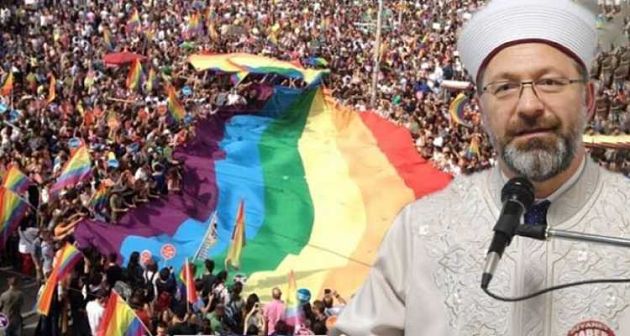The scandal caused by recent remarks about homosexuality by the head of Turkey’s Directorate of Religious Affairs (Diyanet), Ali Erbas (pictured), is not only a major media event, but also an opportunity to reflect on an important political issue.
After the head of the leading Muslim organization in the historically Muslim country made unpleasant remarks about homosexuality, extremist members of the LGBT community launched a campaign against him, and some so-called human rights activists attempted to initiate criminal proceedings against him. Among them were the Ankara Bar Association and the Human Rights Association (İHD).
So, what did the respected Sheikh say about the «defenders of LGBT» almost putting him in jail, which they would certainly do if they had the opportunity? In his speech on Diyanet TV, Ali Erbas said the following: «Islam considers adultery to be one of the great sins. It curses homosexuality. Why? Because it brings disease and degeneration. Every year, thousands of people contract HIV because of adultery and loss of chastity outside of marriage. Let’s join forces to save our people from this evil.
As can be seen, Sheikh Erbas’ statements did not contain any calls for violent action or even legal discrimination, but only an evaluation of a certain phenomenon. Therefore, the advocates of this phenomenon decided to initiate criminal proceedings against him for hate speech. Fortunately, they failed. Turkish President Recep Tayyip Erdogan came to the defense of the head of Diyanet, saying that he was right in his assessment of adultery and homosexuality from an Islamic perspective, as did other representatives of the ruling party and conservative commentators.
Significantly, many of them did so from their positions. For example, Justice Minister Abdulhamit Gul strongly condemned the actions of the Ankara Bar Association, accusing it of violating Article 24 of the Constitution of the Republic of Turkey, which guarantees freedom of religion and speech to everyone. According to him, this is how their attempt to deprive Sheikh Erbas of this right by expressing his opinion and the position of their religion should be evaluated.
The deputy chairman of the ruling Justice and Development Party, Numan Kurtulmus, described the actions of the so-called human rights defenders as an attempt to «kill the law» and accused them of seeking retribution against a person because of his religious views. The spokesman of the same party, Omer Celik, described the actions of these circles as «lawlessness» and «mental fascism», while the party’s general secretary, Fatih Sahin, accused them of inciting hatred.
In addition to supporting Ali Erbas from religious and moral positions, we see his defense from the point of view of the struggle for freedom of speech and religion. After all, whether we like it or not, Turkey is a secular constitutional state that guarantees certain rights to its citizens.
In this particular case, the «defenders of LGBT» appealed to their rights, but the esteemed Sheikh did not call for killing them, throwing them in jail, or even legally prohibiting them from doing what they are doing. He simply expressed his opinion on the matter and the position of his religion. And this is also the realization of his right to freedom of speech and religion, which non-religious or anti-religious circles regularly try to question because they are dissatisfied with the positions expressed by the head of Diyanet. In this particular case, it is clear that extremists among the so-called defenders of the LGBT are seeking an understanding of their rights that deprives their fellow citizens of their right to freedom of speech and religion, and demands that others do what they are not obliged to do — love them, support their choices, and so on.
Fortunately, religious self-awareness and cohesion, as well as the ability to mobilize civically, allow Muslims in countries like Turkey to resist attempts to establish homofascism and homodictatorship, and to defend their rights to freedom of religion and speech.

